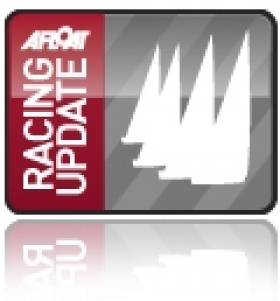Displaying items by tag: Outdoor Education Centre
Spinnaker on Top in Team Racing National Championships
Last weekend's The Irish Team Racing Association National Team Racing Championships attracted it's largest entry for many years, with 21 teams registered.
The event was hosted by the Fastnet Marine and Outdoor Education Centre in Schull, West Cork.
Four teams travelled over from the UK, and 6 under 19 teams, all from County Cork, competed. They joined the keenest of the post-college teams and the leading university teams to constitute the largest Championships that Ireland has seen for many years. Schull, the venue for next year's World Championship, was a major attraction, but the change of date, from March to November, has made it easier for college students and school pupils to attend.

Weekend Team Racing action from Schull. More photos HERE. Photos: Brian Carlin
The weather forecasts had been predicting storms, floods and general mayhem for days if not weeks beforehand. But Saturday dawned to reveal Schull Harbour in an unusual state – the wind had disappeared! Racing started 3 hours later than planned. However, by the end of the day the first round had been completed. This was a seeded round robin, with each of the four League made up of a UK team, a leading Irish team, a leading college team and two others, including the youth teams.
The results of the first round determined entry into the second round – all the UK teams won all four leagues, with the George Knights, the George Gladiators, Supertroopers and UCD finishing second. These teams were joined in the Gold Leagues of the second round by the winners of play-offs between third place teams. The Bumsby Babes, a youth team from Royal Cork YC, had done well to win 2 races to qualify for a play-off against University of Limerick and they were in a strong position when equipment failure meant that one of their boats retired . In the subsequent re-sail UL managed to win the race and qualify.
On Sunday morning Schull was looking it's best in bright but cold sunshine. Unfortunately, the beauties of the West Cork landscape were exactly mirrored in the unruffled water of the harbour! Competitors, who had made a remarkable effort to arrive on time for an 0900 start, barely recovered from the reception organised the previous evening by the World Championship Committee, waited. When racing eventually got underway, in a fitful breeze, it quickly became obvious that there was no possibility of finishing the second round. Plan B was implemented, a knockout round between the four winners of Round One to determine the outright winner, another between the 4 Irish team placed second in the Round One Leagues to determine the ISA medal places and a Youth round.
GP14 World Champion Ian Dobson in Schull
Spinnaker came through the semis and final to win overall first place. The two Royal St George teams qualified for the final. Last year's winners, the Gladiators won the first race only after finishing places were confirmed by a redress hearing. However, the more experienced Knights went on to win the next to races to reclaim the trophy they had "lent" to the Gladiators last year. The third place play-off, which saw some of the noisiest races of the weekend, resulted in a win by Supertroopers over UCD.
In the Youth event Schull A beat Schull B to win the opportunity to take on, and eventually defeat the Bumsby Babes.
Next year's Championship will be sailed out of the Royal St. George on 12-13 November. However the next challenge for Irish team racers will be qualification for the World Championship, with selection trials planned for both the Youth and Open categories early in 2011.
The event was also the first opportunity to try the new TR3.6 which will be used for the Team Racing Worlds. Video below of the new TR3.6 and voice over from Team Racing World organiser David Harte in Schull. Stills by Brian Carlin HERE.
Team Racers Head for Schull
This season's Irish Team Racing Association's (ITRA) National Team Racing Championships will be sailed in Schull on 13th - 14th November. As excitement mounts for next year's ISAF Team Racing Worlds, entries for this year's event have hit a record 21. With 4 teams travelling from the UK, 6 Youth teams, all from Munster, the two Royal St George teams, quarter finalists in this years UK Open (better known as the Wilson Trophy), plus the top college teams the competition should be intense.
To ensure that the competition is fair and sailed to the rules the umpire team includes 4 International Umpires, and includes umpires from the USA, the UK and even Dublin. Race organisation by the Fastnet Marine and Outdoor Education Centre will provide a full dress rehearsal for next year's event. A presentation of plans for the Worlds will be held on Saturday evening, but for competitors the major attraction will be the opportunity to sail the prototype of the specially designed boat that will be used next year.
Following this event the top Irish team racers will be invited to put themselves forward for selection for the teams to represent Ireland in both the Open and under 19 categories at the Worlds. ITRA will invite selected teams to a trial event to be held early in 2011.
For further information please contact: Gordon DAVIES, Secretary, Irish Team Racing Association. Ph; 086 150 1220





























































